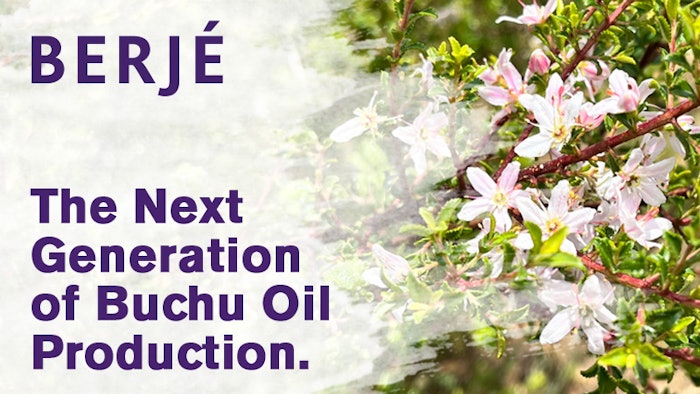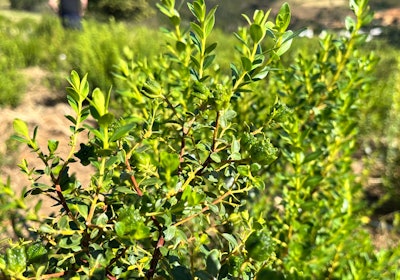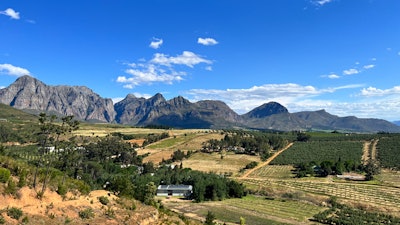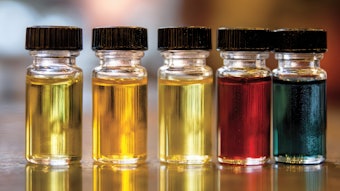
Nestled amidst the mountains and evergreen heathlands of South Africa’s Western Cape, a small bush has maintained an enormous influence on the global flavor and fragrance industry for more than 300 years. The botanical lies within the unique Fynbos biome of South Africa; a small belt of shrubland vegetation that is renowned for its exceptional biodiversity.
For early purveyors of botanical ingredients, this bush was often referred to as “noble’s tea” due to both its cost and rarity. For native populations, it falls under the name “Boegoe,” which describes a wide range of fragrant shrubs used in traditional medicine. But for the modern flavor and fragrance industry, we simply know the herb by its common name—Buchu.

As one of the first American companies to import buchu oil from South Africa, Berjé is more than familiar with the intricacies surrounding buchu cultivation and distillation. There are more than 200 species of buchu, though only two of them are relevant for the purposes of our industry—buchu betulina and buchu crenulata.
Buchu betulina is the more common of the two varieties, though it itself is split into two types— diosphenol chemo type and isomenthone chemo type. The major chemical component of each essential oil changes accordingly to its type, though both types retain significant quantities of limonene, menthone and pulegone. Buchu crenulata, on the other hand, is primarily composed of pulegone (35-50%) and is typically used for manufacturing purposes, rather than direct applications within flavor and fragrance.

In either case, the aroma of buchu oil is intensely pungent and sulfuric when smelled neat, with green and leafy notes that can be overbearing at times. However, when used in small doses, buchu provides an excellent modifier to cassis, raspberry, grapefruit, mango, and other “tart-fruity” profiles. Buchu oil’s powerful diffusive properties also work well in a wide range of colognes and chypre bases, adding to the material’s overall versatility.
Berjé has played an integral role in the buchu oil market since the early 1970s, establishing numerous at-source relationships with farmers and distillers that we maintain to this day. As such, we have observed the troubles surrounding buchu oil production during the 2018 and 2019 seasons firsthand; a massive drought in South Africa combined with deliberate sabotage against agriculture, leading to a massive shortage of buchu in the following years.

However, the crop has since made a full recovery, and buchu fields in South Africa are lush and green once again. New irrigation systems and fire-prevention technology have allowed growers to protect their crops in ways that were previously impossible, allowing this new generation of buchu to remain safe, stable and sustainable for the foreseeable future.
To usher in this next generation of buchu, Berjé has deepened our at-source partnerships with buchu producers in South Africa further than ever, providing us with unparalleled long-term access to the highest quality material available. This initiative allows us to involve ourselves with groups that work to comply with the Nagoya Protocol, such as the Union of Ethical Biotrade. This organization implements benefit-sharing programs with farmers at-source, resulting in our business having an immediate impact on the lives of many local buchu farmers in South Africa.
For centuries, buchu has provided perfumers and flavorists with an incredibly unique and versatile material that is nearly impossible to replicate. Berjé is proud to give back to our partners at-source, maintaining our position at the forefront of buchu oil production for long into the future.
Disclaimer:
The above paid-for content was produced by and posted on behalf of the Sponsor. Content provided is generated solely by the Sponsor or its affiliates, and it is the Sponsor’s responsibility for the accuracy, completeness and validity of all information included. Perfumer & Flavorist takes steps to ensure that you will not confuse sponsored content with content produced by Perfumer & Flavorist and governed by its editorial policy.










